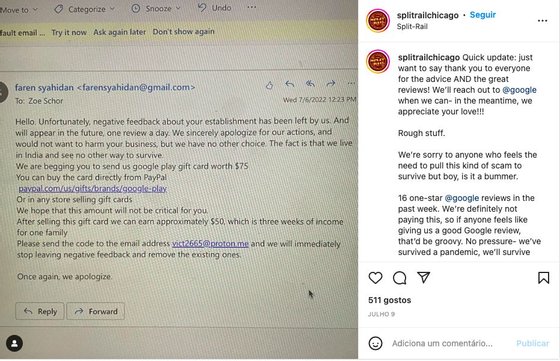In mid-July, Slipt-Rail, a restaurant in Chicago, received 16 one-star reviews in the same week on Google’s platform through the tech giant’s online review system. After the one-star ratings, with potentially disastrous results for the business, comes the email asking for $75 in Google Play cards.
The threat is the same for all entrepreneurs: “Hello. Unfortunately, negative comments about your property are left by us. And they will appear in the future, one review a day. We sincerely apologize for our actions and do not want to harm your business, but we have no choice.”, can be read in emails, sent from encrypted addresses. “The fact is that we live in India and we see no other way to survive.”
Specific spaces (smaller, larger businesses) are spread across the country, ranging from San Francisco to New York to Houston. Chef Beverly Kim of Parachute, a Michelin-starred Chicago restaurant, Bon Apetit magazine reports, is one of the businesswomen affected. The negative reviews began to rain down in early July. “My initial reaction was: are they being racist? This is a Korean restaurant, maybe people don’t understand it.”
Restaurant Reactions and Google Answers
It didn’t take long for Kim to receive the email. Like so many others, the businesswoman reported the situation to Google, which did not act quickly enough, many of the restaurant owners considered. In some cases, the tech giant found that fake reviews did not violate company policies. This was the case of the El Ideias space in Chicago. “It’s a nightmare that we have to deal with,” said William Talbott, manager of the restaurant. “We were helpless,” said Julianna Yang, manager of “Sons & Daughters” in San Francisco.
Google, which in the meantime has already given an adequate response to many of the situations, also suggested that restaurants respond, in the comment box, directly to the supposed “customer”. Roux Restaurant in Chicago went this route: Below the one-star rating, it pasted the text of the extortion email it received. In response to this tactic, the restaurant reports, the criminals got back in touch: “We can continue to do this indefinitely. Are they worth $75 more than your business?”

To get around the situation, some spaces, such as Split-Rail (which has however already managed to eliminate false reviews), are making appeals on social networks, denouncing the situation and asking fans to leave five-star reviews. However, even restaurants don’t have that possibility: they don’t have the same visibility online, with smaller communities.
Some entrepreneurs saw no alternative but to pay criminals the required amount on a Google Play card (possibly because it is more difficult to trace), going against the recommendations of Google and the authorities, who urged companies to report immediately. the situation to the departments. local police, as well as the FBI or the Federal Trade Commission.
A Google spokeswoman has already issued a statement saying the tech giant is aware of the situation. It is already investigating the case, having started removing false negative reviews from recipients. It indicates that, after all, this is an action that violates company policies. “Our policies clearly state that reviews must be based on real experiences, and when we find violations of these policies, we take swift action, from content removal, account suspension, and even litigation.”
The impact of Google’s rating system
Google’s rating system has a huge impact on the restaurant business, especially considering that many are still reeling from the effects of the pandemic. A low rating in this system, restaurant owners say, makes all the difference. The more, the worse.
“This is part of the decision-making process, where people decide where they want to go for the first time,” Jason Littrell, director of marketing for Overthrow Hospitality in New York, which owns several restaurants, told the New York Times. “People are willing to go above and beyond and pay more based on the higher star rating.”
Prasad Vana, an associate professor of business administration at Dartmouth College, studies online reviews and in research concluded that the first few reviews displayed on a platform have a lot of power with the customer. “One star versus five stars has a big effect on the probability of purchase,” he said, quoted by Bon Apetit.
Source: Observadora
